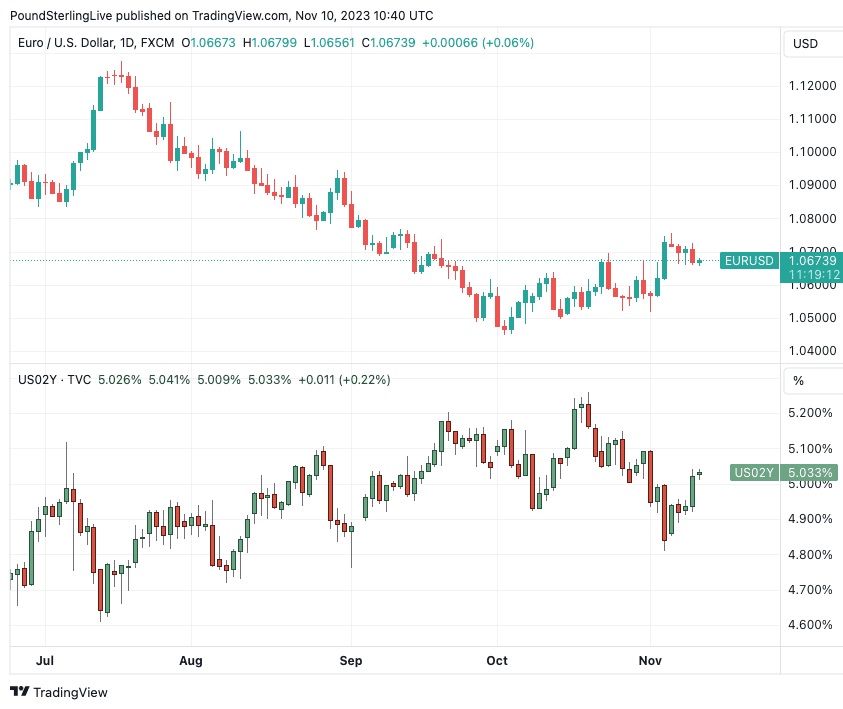 In what seems to be a planned effort, various Federal Reserve officials have conveyed a unified message this week, contributing to the Euro to Dollar exchange rate’s potential weekly decline. Emphasizing the remarkable strength of the U.S. economy, these officials have indicated a possible need for further interest rate hikes to curb inflation.
In what seems to be a planned effort, various Federal Reserve officials have conveyed a unified message this week, contributing to the Euro to Dollar exchange rate’s potential weekly decline. Emphasizing the remarkable strength of the U.S. economy, these officials have indicated a possible need for further interest rate hikes to curb inflation.
Coordinated Guidance Shapes Market Expectations
Federal Reserve Chairman Powell, echoing the sentiments of his colleagues, asserted that the central bank “will not hesitate” to tighten policies if deemed appropriate. This concerted effort appears to be a strategic move to influence market expectations, a narrative further emphasized by Powell’s statement that the Fed is not yet confident in the sufficiency of its policies to combat inflation.
Hawkish Remarks Boost Dollar and Bond Yields
The market responded predictably to these hawkish remarks, witnessing a strengthening of the dollar as U.S. bond yields surged, enhancing the reserve currency’s interest rate advantage. The impact was accentuated by a disappointing 30-year debt auction, characterized by notably weak demand.
Future Outlook: Inflation Report Shapes Expectations
Attention now turns to the upcoming CPI inflation report, expected to mold predictions regarding the future interest rate trajectory. Traders are contemplating the central banks’ actions in the coming year, speculating on which ones will initiate rate cuts and the depth of such reductions.

Wall Street Reaction and Corporate Earnings Concerns
Federal Reserve’s firm stance affected Wall Street, interrupting an eight-session winning streak for U.S. stocks. Powell’s hawkish comments led to a 0.8% decline in the S&P 500, erasing gains for the week. Despite strong equity performance earlier this month, questions arise about the sustainability of corporate earnings growth, particularly as the economy potentially loses momentum.
UK Economic Landscape: GDP Data and Pound’s Response
In the UK, positive surprises in quarterly GDP data failed to lift the pound as the economy stagnated in Q3, contrary to forecasts anticipating a minor contraction. A concerning drop in business investment, coupled with pessimistic business surveys, hints at challenges ahead for the British economy.
Gold’s Unusual Resilience Amidst Economic Pressures
Surprisingly, gold prices defied the negative impacts of rising real yields and a strengthening U.S. dollar, trading higher in yesterday’s session. Typically, rising yields and a stronger dollar make gold less appealing. However, gold’s resilience suggests potential central bank interventions, possibly through direct purchases to bolster their reserves.
Speculators Reevaluate Positions
Despite the ongoing conflict in the Middle East, the absence of a material escalation has prompted speculators to reconsider their long positions in gold, initially intended as protection against an intensified conflict. This reevaluation aligns with a notable decline in oil prices this week.
Consumer Sentiment Survey: Today’s Highlight
Looking ahead, the University of Michigan consumer sentiment survey stands out as a key data release for the day, offering insights into the public’s perception of economic conditions. As the week unfolds, the intricate dance of economic indicators continues, shaping the narrative for global financial markets.




